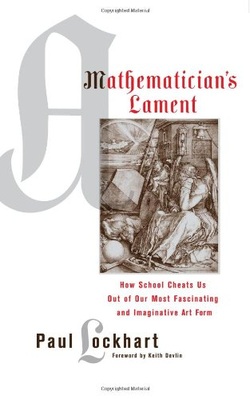It is a marvelous little book of 140 pages, that makes a simple, 3 part argument about how to improve mathematics education the US.
Unfortunately, 89 pages of the book remains unwritten and it contains the third, decisive part of the argument.
The argument looks like this:
1) Math as it is taught in the US is boring
2) Math doesn’t need to be boring. In fact, math is interesting and beautiful
3) We can teach children the beauty and fascination of math in US schools by doing X.
Lockhart devotes 90 pages of the book to the first proposition, about 88 pages more, I estimate, than is necessary.
Lockhart suggests that the root of the problem lies in how teachers conceive or mathematics. Actually, it’s how everyone (save mathematicians) conceive of mathematics. We see it as a rigid, rule-based, practical. Lockhart offers mathematics as aesthetically pleasing problem solving. No more, no less.
Mathematical ideas are inherently interesting, charming, fun. If you’re not interested, you’re doing math wrong—or being taught math wrong.

Lockhart suggests that teaching math requires intense personal relationships with students, “choosing engaging and natural problems suitable to their tastes, personalities, and levels of experience,” and being flexible and open to the students’ shifts in curiosity. Lockhart doubts most teachers are interested in this sort of thing, and he suggests that most teachers see it as too much work (p. 44).
Later (p. 82) bureaucrats are blamed; they won’t allow individual teachers to follow their instincts. Later, we’re told more bluntly that schools ruin not just math, but all subjects.
But what of the third part of the argument in which Lockhart ought to tell us how make things better?
His vision of “better” is that teachers will pose interesting problems to students—he offers many compelling examples—and students will work on these problems under the guidance (ideally, the minimal guidance) of the teacher. The best learning, he avers, is where the student is doing math (i.e., creating arguments, finding patterns) rather than executing formulae described by others.
There is an irony here. Lockhart describes mathematical arguments as two-headed. One head is relentlessly logical, and rigidly insists that an argument be airtight. The other head has aesthetic criteria, and seeks an argument that is elegant, lovely, and that sheds light as it proves.
Lockharts prescription is all lovely and not enough logic.
For someone who excoriates a system that would allow people who don’t know the history of math to teach it, Lockhart is surprisingly quick to write about educational practice in the absence of any knowledge of its history.
Giving students interesting problems and aiding their efforts to solve them as the workhorse method of classroom learning—that idea has been mainstream for about 100 years. Further, surveys of teachers consistently show that they believe this method (and closely aligned methods) to be not only effective but desirable.
Teachers don’t fail to use these methods because they are lazy or because bureaucrats won’t let them.
These methods are really hard to pull off. Your knowledge of math needs to be very deep because the problem may pivot in an unexpected direction. Your classroom management needs to be flawless because you are expecting the students to work more independently. And both knowledge of math and classroom management will be tapped further by the fact that you must make many decisions in the moment, as the classroom situation is very fluid.

A much more effective approach has been adopted by Hung-Hsi Wu, a mathematician at Berkeley. Wu has argued that a key problem is that today’s math teachers—products of the American system themselves—don’t get math. The solution is to teach them some math. (I once listened to a 30 minute explanation by Wu of why our system of whole numbers works the way it does. Quite literally, stuff that first graders can and should know. I was spellbound.)
In contrast to Lockhart, Wu has some faith in teachers. If they understand mathematics, they will teach it. He is also less dogmatic than Lockhart, who unthinkingly assumes that they only way to learn a topic is to practice it the way experts practice it. Indeed, some important elements that Lockhart wants to see—especially discovery—are present in some quite traditional approaches, especially the Japanese approach to teaching, as described by Jim Stigler.
Righteous indignation should be an occasional guilty pleasure, not a blueprint for math education.
 RSS Feed
RSS Feed